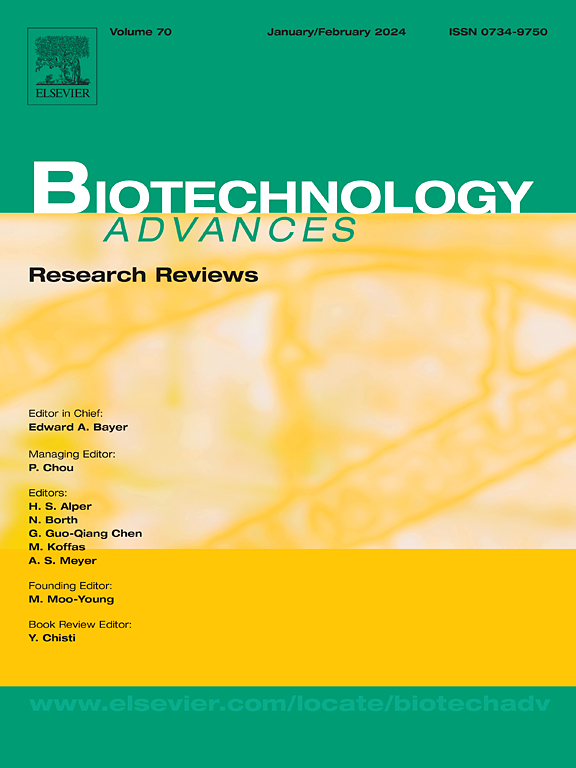酶法新合成寡核苷酸:新兴技术和进展。
IF 12.1
1区 工程技术
Q1 BIOTECHNOLOGY & APPLIED MICROBIOLOGY
引用次数: 0
摘要
寡核苷酸合成是现代生命科学的基石,使分子诊断、治疗开发和包括DNA数据存储和可编程生物系统在内的变革性技术取得突破性进展。虽然基于酰胺磷的化学合成仍然是工业标准,但其在生产长序列结构、累积错误率和对有毒溶剂的依赖方面的局限性,对下一代应用构成了重大挑战。新兴的酶合成方法通过利用生物系统固有的精度和环境可持续性提供了范式转变。这篇全面的综述系统地考察了寡核苷酸合成技术的发展前景。我们首先分析了传统化学方法的机理基础和持续局限性,然后对酶的策略进行了批判性评估,特别强调了末端脱氧核苷酸转移酶(TdT)介导的模板无关聚合。这项工作为酶促反应工程提供了详细的见解,包括核苷酸类似物的底物特异性分析和创新的固相合成平台,能够迭代核苷酸添加。此外,我们还讨论了新兴的高通量合成架构和商业翻译工作。综上所述,本文综述了酶促合成技术的进展和商业化现状,为加快酶促寡核苷酸制造平台的创新发展提供了有价值的指导。本文章由计算机程序翻译,如有差异,请以英文原文为准。
Enzymatic de novo oligonucleotide synthesis: Emerging techniques and advancements
Oligonucleotide synthesis serves as a cornerstone of modern life sciences, enabling groundbreaking advancements across molecular diagnostics, therapeutic development, and transformative technologies including DNA data storage and programmable biological systems. While phosphoramidite-based chemical synthesis remains the industrial standard, its limitations in producing long-sequence constructs, cumulative error rates, and reliance on toxic solvents pose significant challenges for next-generation applications. Emerging enzymatic synthesis approaches offer a paradigm shift by harnessing the inherent precision and environmental sustainability of biological systems. This comprehensive review systematically examines the evolving landscape of oligonucleotide synthesis technologies. We first analyze the mechanistic foundations and persistent limitations of conventional chemical methods, followed by a critical evaluation of enzymatic strategies with particular emphasis on terminal deoxynucleotidyl transferase (TdT)-mediated template-independent polymerization. The work provides detailed insights into enzymatic reaction engineering, including substrate specificity profiling of nucleotide analogs and innovative solid-phase synthesis platforms enabling iterative nucleotide addition. Furthermore, we discuss emerging high-throughput synthesis architectures and commercial translation efforts. In summary, this review comprehensively encapsulates the advancements and commercialization status of enzymatic synthesis technologies, offering valuable guidance that can expedite the innovative development of enzymatic oligonucleotide manufacturing platforms.
求助全文
通过发布文献求助,成功后即可免费获取论文全文。
去求助
来源期刊

Biotechnology advances
工程技术-生物工程与应用微生物
CiteScore
25.50
自引率
2.50%
发文量
167
审稿时长
37 days
期刊介绍:
Biotechnology Advances is a comprehensive review journal that covers all aspects of the multidisciplinary field of biotechnology. The journal focuses on biotechnology principles and their applications in various industries, agriculture, medicine, environmental concerns, and regulatory issues. It publishes authoritative articles that highlight current developments and future trends in the field of biotechnology. The journal invites submissions of manuscripts that are relevant and appropriate. It targets a wide audience, including scientists, engineers, students, instructors, researchers, practitioners, managers, governments, and other stakeholders in the field. Additionally, special issues are published based on selected presentations from recent relevant conferences in collaboration with the organizations hosting those conferences.
 求助内容:
求助内容: 应助结果提醒方式:
应助结果提醒方式:


